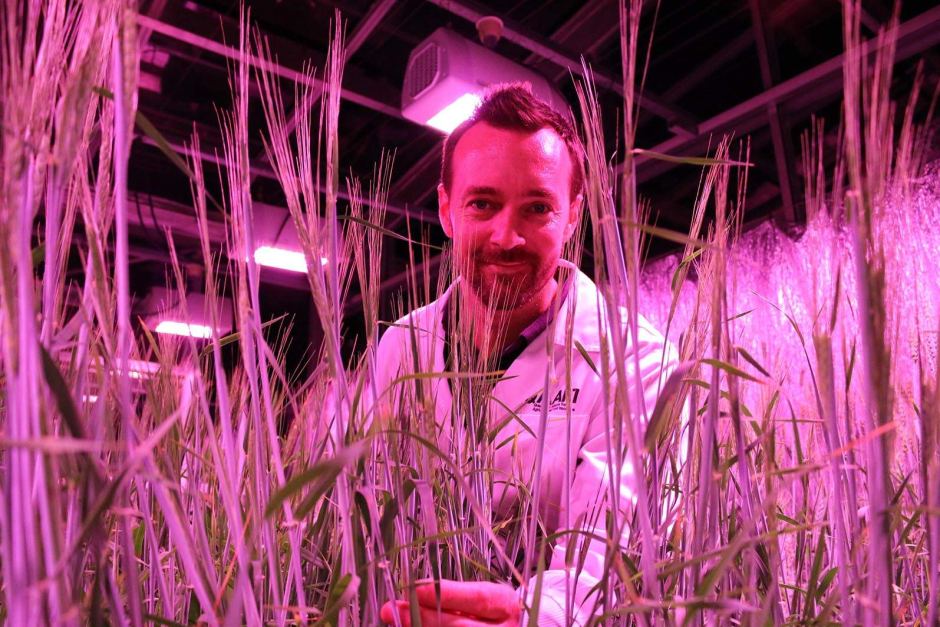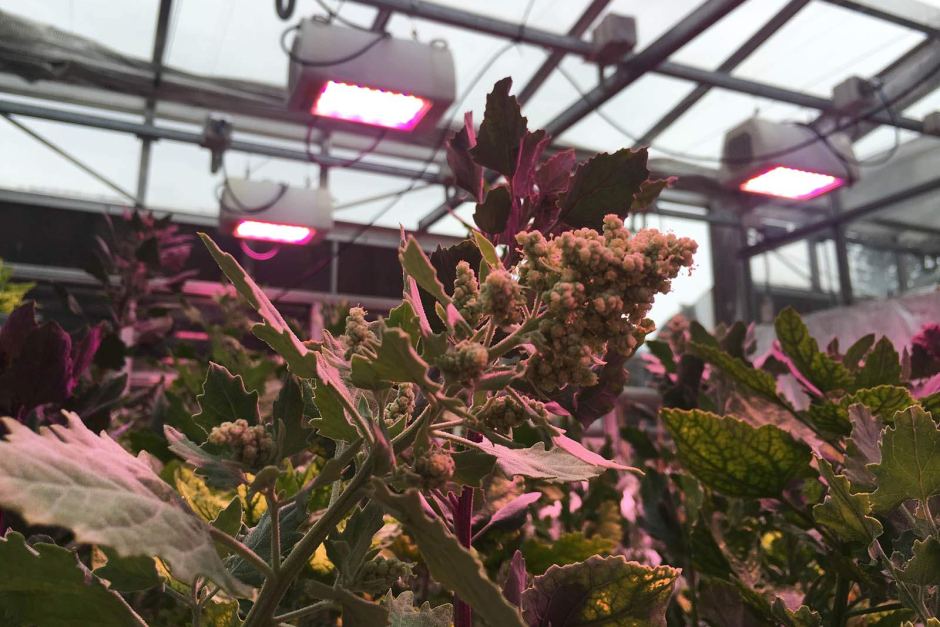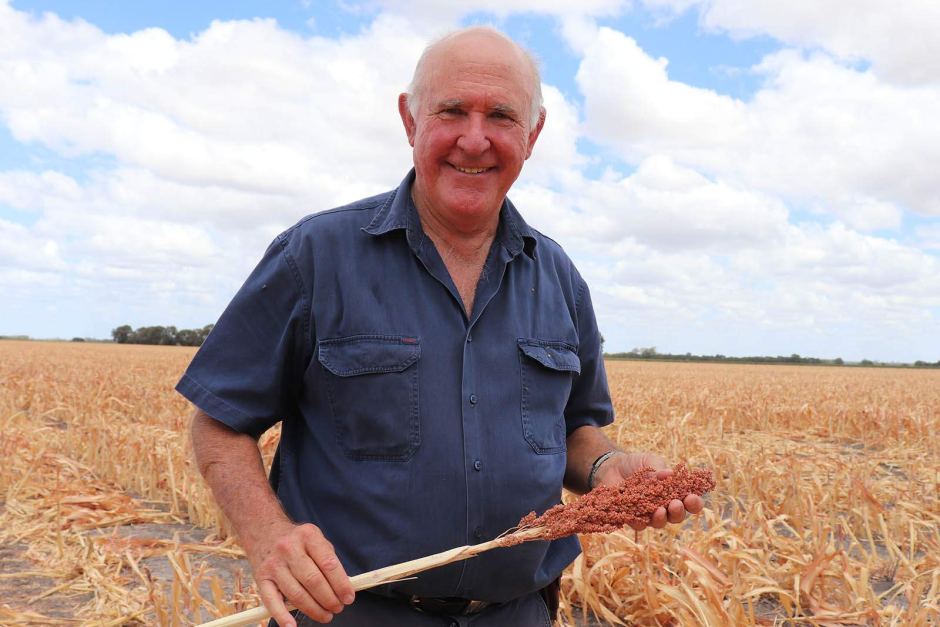ABC News report by Rachel Riga ABC News - 15 March 2019.
Queensland researchers are speeding up the life cycle of crops to develop new varieties for Australian farmers in a bid to minimise the impacts of drought and climate change.

Key points:
- UQ researchers have developed speed breeding to develop more resilient food crops
- Their first wheat variety was handed to Australian growers last year
- The technology is being shared with the UK and Asian and African nations
With the United Nations estimating the world's population will hit 9.8 billion by 2050, Australian researchers are at the leading edge in a global search for ways to dramatically improve crop yields, land use and food security.
The world-first speed breeding technique was developed by scientists at the University of Queensland, who use light and temperature-controlled greenhouses to accelerate plant growth and deliver more tolerant crops.
Senior research fellow Dr Lee Hickey, who has been involved in the program for more than a decade, said it could take 20 years to develop crops with drought and disease resistant traits, but the greenhouses delivered these results in half the time.
"We can now grow up to six generations of wheat, barley, chickpea and quinoa per year in greenhouses instead of just one or two in the field," he said.
"We're trying to track down the genes controlling drought tolerance or disease resistance and so this can have big flow-on effects to accelerate the development of more robust crops for farmers."
The temperature of the greenhouses are kept between 22 to 17 degrees Celsius and LED lights remain on for 22 hours a day to create conditions that lead to early flowering and seed harvest in the plants.
Once the plants have been bred with the improved genetics inside the greenhouses, they are put to the test in the field to ensure they produce good yields before being handed over to farmers.
The first wheat variety completely bred and developed in the speed breeding system was released to Australian growers last year.
It includes a trait that stops mature grain crops from prematurely germinating after rain or a storm.

Dr Hickey said the technique was originally designed for wheat crops, but had been adapted for barley, canola, chickpea, peanuts and potatoes.
"As we've seen, the past 12 months has been a bit of a rollercoaster for our farmers, going from one of the worst droughts we've ever had in Queensland and New South Wales, to floods in the north — it's a bit like being in a lottery being a farmer," he said.
"Climate change is happening now, it's not a futuristic thing.
"What does this mean in terms of our crop production? It means we really need to deploy a whole bunch of different traits — like deep rooting so the plant can access stored soil moisture — into these crops to make them more robust."
QAAFI researchers are also sharing the technology with the United Kingdom and with Asian and African nations in a bid to combat severe crop losses from drought and heat.
Dr Hickey recently returned from a trip to India where extreme heat had forced researchers to look into building large speed breeding warehouses to grow sorghum, millets, pigeon pea and ground nut plants.
Growers eager for more robust crops
Food growers on the Darling Downs have experienced their third dry summer in a row and the combination of below-average rainfall and hot weather have halved crop yields.

Grain farmer Wayne Newton grows sorghum, mung beans and dryland cotton on his property, west of Dalby, and is hoping for some decent rain in the coming months.
"It's been another one of these disastrous summers," he said.
"Summer is normally the time we get most of our rain, but we've just come through January and we've basically had no rain to talk about."
Mr Newton said grain varieties had improved in the past 30 years, with higher yields, improved resistant to disease and water use efficiency.
"Crop breeding, crop research and development is a key cornerstone to our industry and thankfully the grain industry collectively contributes an awful lot through levies that are used to fund the research work that is carried out by universities, the CSIRO and the Department of Agriculture," he said.
"It makes a big difference to our final yield and to the final profitability of a crop ... and it's not just us as grain farmers, our commodities like sorghum and wheat are used to feed livestock so there's a whole larger industry that is dependent on the things that we can grow."
CSIRO research scientist Richard Richards said there were also other techniques to fast-track the identification of plants with good genetics.
One technique utilises thermal imagery to scan crop fields for plants with good root systems.
"The speed associated with this technology was not available five years ago," Mr Richards said.
"It has only been made possible with sensitive thermal cameras that are not too expensive, cheap airborne systems such as drones, the ability to rapidly store and process thousands of images and the knowledge that the temperature of plants vary according to health.
"Given we can capture thermal images of thousands of plots in seconds with this new technology, then breeding gains may be enhanced."
Contact: Dr Lee Hickey, Senior Research Fellow, QAAFI Centre for Crop Science, The University of Queensland, T. +61 (0)7 3365 4805 or E. l.hickey@uq.edu.au
Original source: This story was produced by ABC News on 15 March 2019 by Rachel Riga - Speed breeding of crops by Queensland researchers in bid to battle global hunger.



